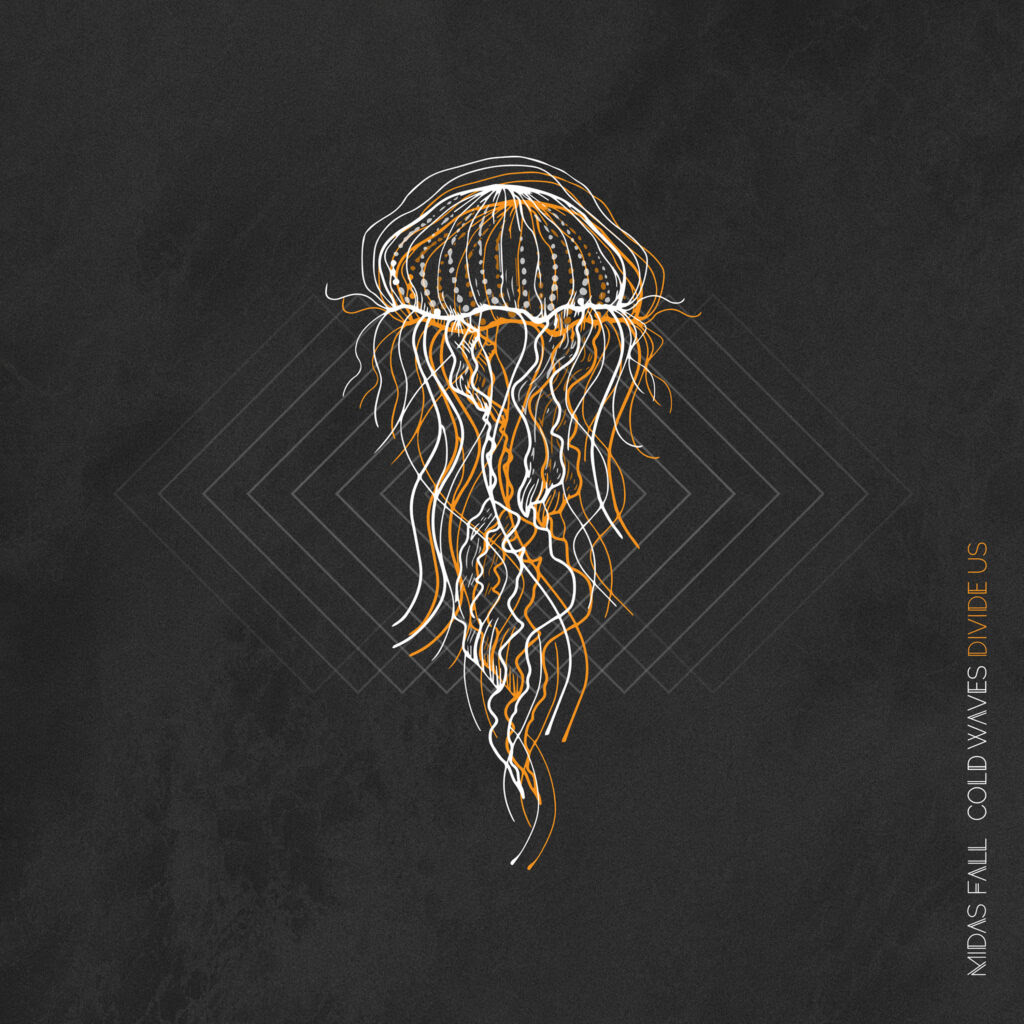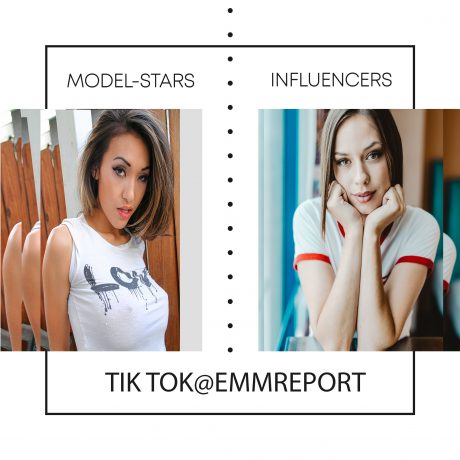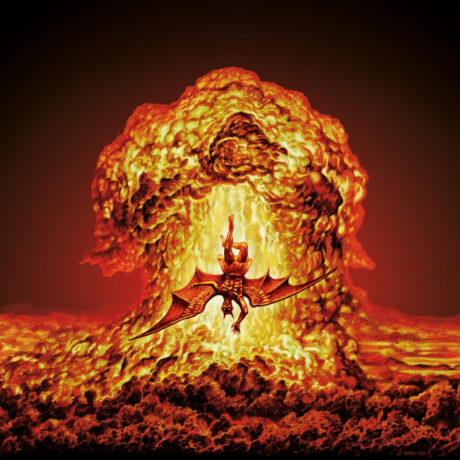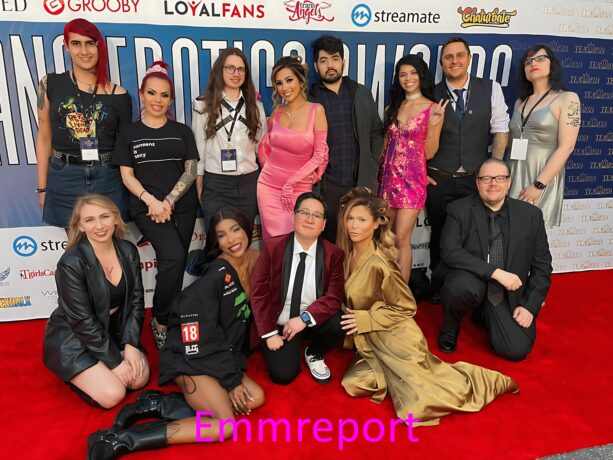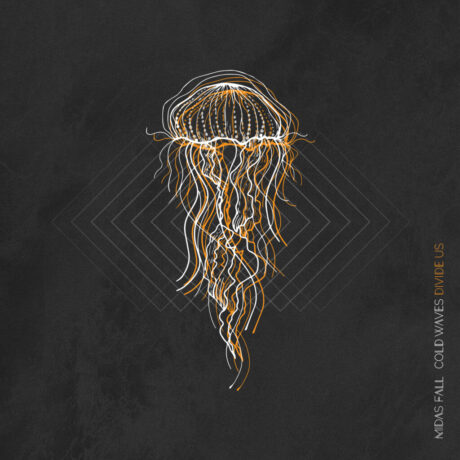
As Midas Fall prepare to release their much anticipated new album “Cold Waves Divide Us”, the band sat down for an extensive discussion on all things Midas Fall. The new album, the creative process, the changes within the band, upcoming touring plans and more.I’ve also attached the official release info as well:

Cold Waves Divide Us, the fifth full-length album from Scottish progressive post-rock trio MIDAS FALL, is available worldwide on Monotreme Records and is streaming everywhere.
For the follow-up to their critically lauded, 2018-released full-length, Evaporate, founding MIDAS FALL members Elizabeth Heaton and Rowan Burn are joined by Michael Hamilton. Cold Waves Divide Us sees the band at their most confidently visceral, each song moving beautifully between quiet and loud, gentle and crushing. “This album is a heavier and bigger experience than the last album,” notes Heaton. “We kept the atmospheric strings and ‘80s synths of Evaporate but wanted to add heavier layered elements, to represent more what we sound like live.”
Opener “In the Morning We’ll Be Someone Else” starts quietly with serene piano and vocals, ominously ratcheting up the tension to walls of crashing guitars and Heaton’s soaring vocals. “I Am Wrong” thunders along on pounding rhythmic drums swirling around heavy swathes of low and delicate melodic highs. With “Monsters,” the band is more contemplative, with an ethereal beginning making way for gorgeously syncopated guitar and drums, while “Cold Waves Divide Us” builds slower, allowing Heaton’s voice to gracefully float over the growing force beneath it. “In This Avalanche” is a bittersweet lullaby showcasing Heaton’s heart-rending vocals in one of the quieter moments on the album. Elsewhere, “Point Of Diminishing Return” sees a more electronic influence, with glittering shimmered synths taking the space where guitar melodies were, but with all of the post-rock beauty that the duo are known for, something “Little Wooden Boxes” showcases perfectly, expertly hovering between gentle clean guitar and piano, and exhilarating, uplifting full-band, full-bore epic.
Cold Waves Divide Us is now available on CD and digital formats as well as limited edition 180g vinyl, with 150 copies pressed on Black and 350 on Clear w/ Orange/Black Splatter.
Order the record at the Monotreme Records webshop at THIS LOCATION and find the record on streaming services HERE.
Watch MIDAS FALL’s videos for “Cold Waves Divide Us” video HERE, “Monsters” HERE, and “I Am Wrong” HERE.
Stream MIDAS FALL’s Cold Waves Divide Us HERE.
MIDAS FALL:
Elizabeth Heaton – vocals, guitars, strings, synths, piano, drums
Rowan Burn – guitars, synths, piano, drums
Michael Hamilton – bass, synths, drums
https://www.instagram.com/midasfall
https://www.facebook.com/midasfall
https://www.twitter.com/midasfall
https://www.monotremerecords.com
https://www.instagram.com/monotremerecords
https://www.facebook.com/MonotremeRecords
Editor: Ralph Greco Jr.
Dominic:
Michael:
Elizabeth Heaton:
Rowan Burn:
D: Tell me about your upcoming album.
M: It’s called Cold Waves Divide Us. The two singles are “Monster” and “Cold Waves Divide Us.”
D: I have to admit I’m not a fan of electronica, but the way you guys blended the vocals and everything is amazing, what is that process like?
M: We started with the band sound, with the guitars, drums etc. So, the electronic stuff, it was never the focus. It was always there to add to the acoustic, traditional rock instrumentation after the fight.
D: It’s just kind of weird where a lot of this reminds me that this is music to me as opposed to, I don’t want to make anybody sound bad today, but thankfully a lot of your stuff sounds like you’re making music because you enjoy making music as opposed to making music to sell something.
M: Yeah if we were trying to make money we wouldn’t be making this kind of music.
D: Yeah, it just seems like a lot of the stuff today is as the music is almost an afterthought.
M: I get it. There’s always a pressure to focus on the image and social media, but making music is just so much easier than that stuff.
At this point Elizabeth Heaton joins our discussion.
D: You are in Scotland too, right?
L: I’m up in Scotland. I’m about two hours north of where Michael lives.
D: Does the album have a theme? Is it a concept album? Is it just songs combined?
L: I think it’s kind of a journey. The album, especially because it was written over quite a few years and we’ve ordered it specifically so that the first songs on the album were written first and then they kind of go in an order like that, so, yeah, I’d say it’s more of an album that goes on a journey than a concept album.
M: I didn’t know that. That’s cool. I just took every song one at a time. I didn’t even think about the order that they were started with. So that’s cool.
D: Was that length of time on purpose? Did something happen? Did you guys take a break? Did the band change? Was it COVID? Was it all of it?
L: Lots of things, I think. Wasn’t it, really?
M: Yeah. I think, like Covid was a big one, obviously. I joined the band in two thousand nineteen, which was kind of like, as the band was kind of winding down from the tour of the previous album, and they had the intention of like, OK, short break, work on the next album. But then by the time we got to it, Covid happened. And with that, everybody’s lives fell apart and the world’s caught fire and stuff like that. So we kind of had to wait for things to calm down a little bit and then just kind of as Liz said, kind of piece the album together as best we could.
L: It didn’t stop us writing, but I think it definitely slowed down the pace of things. Ordinarily we’d sort of be in the same room together or work things out together, but we basically had to deal with a lot of it by file transferring online, and just everything just took longer than it ordinarily would.
M: Yeah, I think because we knew when we were writing the album, especially at the earlier stages, we kind of knew that there wasn’t much scope for touring it. So we’re like, well, I certainly almost didn’t really want to rush it because I was like, well, I don’t really want to finish this album, release it, and then not be able to go out and play shows to promote it. So,I don’t know if it was deliberate or not, but things calmed down and the world started moving again, I think that was when I was certainly a lot more motivated to write, okay, let’s get this album finished so we can actually go out and promote it and do all the stuff that’s cool about being in a band.
L: I know a lot of people during COVID were like, oh, it’s great. I got to write and record all this stuff, but I feel like sitting about in the flat isn’t actually that inspiring, is it? There’s not a lot of inspiration that comes from that.
M: Exactly.
D: But the writing process, do you have a melody? Does she have a melody? Do you guys have a riff? Do you have something?
L: I think, each song’s kind of different, isn’t it?
M: Yeah.
L: And the way each song started is different. I guess some start from just sort of a bare-bones guitar and vocals. I mean, to be honest, that’s probably how most of the songs start and then they get layered up. Or maybe some songs have just a piano line or a guitar riff. And then…
M: I think the kind of process tended to be, for most songs, either Liz or Rowan would have some kind of initial idea.
Rowan enters the conversation.
Hello Rowan, how are you?
L Fashionably late.
R: Sorry, I keep opening fucking windows and the computer hates me as much as I hate it, right? Every fucking time. Sorry.
M: Ok, as I was saying , basically, most songs tended to start with Liz and Rowam having like, an initial idea, maybe something new, or maybe it was something from, you know, years ago that…they maybe put together and forgot about for a while. And then they would either develop it themselves, a lot like Liz would maybe put some vocals to it or Rowan would like put some guitars to it or like flesh out the arrangement a little bit. Usually what that would result in is some kind of structure, at least some kind of indication of the dynamics of the song, which is kind of the point where I would end up getting sent to it. Sometimes it would be a really basic idea with a lot of space and other times it would be quite full. And then that would tend to dictate, OK, maybe I just need to do my bass part. But then if the song had a bit more space to it, maybe there wasn’t so much guitar or maybe there wasn’t so much vocals or drums done already, then I would think about, oh, how can I flesh this out with some more drums or some more electronic stuff or some more orchestral stuff. I think it was Rowan’s idea to do most of the orchestral stuff on the album actually.
L: I think as well is that we’ve kind of got a habit of writing too much and then stripping back in the arrangement section. So what your probably hearing in our music is, we’re all about layering different things, strings, guitars, synths. So often we do too much and then have to be like, actually that sounds a bit cluttered. We need to pull these sorts of things back.
D: When you start making new material, consciously, do you say, well, that kind of sounds like something we did earlier. We’re going to try something different.
L: I don’t know, I mean every band has their own kind of sound, don’t they, in their own sort of comfort zone in a way that they lean into. I guess that’s the same for us. But I think especially with this album, we’ve tried to explore the heavier side of the band and heavier instruments and arrangements. So, in that way we’ve stepped out of our comfort zone a little bit.
M: I wasn’t around for the last album as well. Liz and Rowan. So introducing like a third kind of variable to that equation. Even though I wasn’t trying to, you know, I didn’t try to make the album heavier, I don’t know, maybe it just kind of ended up that way.
L: It was never a discussion, was it? That’s just how it evolved naturally. And if you listen to the album before that, Evaporate, it was almost had a more minimalist sort of Scandinavian noir feel to it. And I don’t know if that just came at the time of where we were living and sort of the fact that it was more of a bedroom recording. At the time I was listening to a lot of Oliver Arnold and stuff like that, which I think came through a lot in the music back then.
R: Yeah, it’s never a conscious decision. We don’t sit down and say, you know, like, oh, let’s make this really fucking heavy or let’s make this really light. It just ends up how it ends up. I think it’s quite simple, really. It’s like, it sounds how it sounds and that’s not really sound one way or the other.
M: What was kind of funny though, to relate it to the last point was, I sort of like, like Liz was saying, part of the process of our songs is quite often stripping things back after that’s the kind of phase two of a lot of the songs. I knew that was the kind of approach that Liz and Rowan had. So when I got sent the initial kind of framework to kind of do my bits for it, I was like, I kind of took the kitchen sink approach where I just flung everything at it. With expecting Liz and Rowan to take some stuff out. I would, for pretty much every track, always be surprised about how much I got away with.
L: You’d send me files, Michael, and I’d be like, oh, there’s quite a few synth lines. Okay, let’s listen through these.
M: I think so many of them were like, oh, maybe track three or track four, but then I’d hear…final track, and then both of them would be in it even though I never really intended it to be that way.
R: And also an element of ruthlessness as well because you know when you’ve got all that in there sometimes it is too much. I think we’ve got to be a wee bit ruthless with things like that because it could sometimes with some tracks, go on forever. How many fucking guitar lines does it need? It doesn’t need twelve!
D: “Cold Waves”, first single from the upcoming album, lyrically, are your based on, or are some of your songs personal experiences?
L: Some of them, yeah, like “Monsters” I think has to me anyway, because I wrote it while I was having a panic attack and trying to navigate myself out of a panic attack. But there’s other songs on the album that were written vocally not with lyrics in mind, they were more just kind of using my voice as an instrument and making noises. So, the lyrics were more of an afterthought, whereas in “Monsters” they were kind of at the forefront. Yeah.
R: Plus some of the tracks are work in titles that don’t have anything to do with lyrics. I guess in that regard it does leave things open for the listener to interpret both the music and the lyrics in whatever way fits for them or suits them. It leaves it wide open I suppose.
M: It’s one of those things about this band. I think a lot of bands that sound similar to Midas Fall tend to not have singers. One of the attractions that instrumental bands tend to have is the kind of that ambiguity that Rowan’s talking about. But I think one of the things I really like about Midas Fall, and I think the thing that kind of sets us apart is, even though we’ve got a singer who is singing words, there still has that kind of… It still has that kind of poetry in it, where it can be open to interpretation without even being really convoluted with the lyrics or anything. I think Liz is a great lyricist, but she can still tell a story.
L: I do enjoy metaphors and masking all those emotions and metaphors. Masking all those…
M: Yeah, it’s great though. And I think it’s one of the big draws to this band. I think a lot of people talk about the music, but just as much people will talk about the lyrics as well, like fans. I’ve heard, definitely.
D: When you’re editing the songs, how do you know when a song is done? Because you mentioned like there were a bunch of different versions and stuff.
M: When the computer can’t play it anymore.
R When you want to jump out the fucking window.
M: That’s when you know you’re done. Yeah, when you hate it, that’s when you’re done. No, I’m not saying… I just love that fucking song.
L: I think realistically, when you think…you’ve kind of at that point where you’ve almost oversaturated it with layers, it’s time to walk away for a few days and then as soon as you listen back with fresh ears you’re like nah, that goes, that goes, as fine as it is.
M: Yeah, it’s like the song’s in there somewhere, you just have to trim the fat I guess.
L: You do get ear fatigue when it comes to writing in the same way that when you’re mixing a track I think you need to step
M: Yeah, definitely.
K: Well, you do all the mixing really, so thankfully I don’t have that particularly.
L: I think when I was younger, when we were making the first couple of albums, I struggled more with knowing when to call it a day. Whereas I’m a little bit more sure in myself and confident and be like, yeah, that’s…
M: I think it’s a skill you develop, definitely, because you know, even though I’m part of Midas Follow, I do, I write so many other kinds of music on the side as well, we all do. It’s just a skill to be honest. It’s just ear training, I think. It’s hard to choose a thing that’s hard to regulate.
D: How many tracks are on the actual album? Did you know that when you… went in, we only want to put X amount on it, is that what you guys were happy with when you were done mixing everything?
L: How many can you fit on a vinyl?
M: Exactly.
L: We’ve actually got about a surplus of about five or six songs, and we kind of had to pick and choose which ones to go on the album. But ultimately, yeah, the restraint is, you’re putting something on vinyl, you do have a time limit on each side. And if we kind of put any more songs, we’d have just been pushing it.
R: Also, there are a couple of songs where it’s like, you know, maybe on the fence about it or whatever. And it’s like, what’s the running time? Right, well we can fit that one or that one, I can pick which one is going to be, right, that, Ben. Well.
L: And then you’re in double vinyl territory and we can’t afford that.
M: No, exactly.
L: Vinyl is such an important source of income for us though, especially when we’re gigging. I mean, we are kind of joking, but we’re also kind of not joking that like, you know.
R: True, you’ve got to have a kind of practical approach to some of it. But no, there’s never really been any intention to put any particular number of tracks on any given album. We could have put four songs on it and they could have been fucking, you know, 20 minutes long. Although we would have had to prune one of them down. How many sides is it? How much do you get for vinyl? Is it 50 minutes, 45?
M”45, give or take. It’s like 23 minutes per side.
K: So you know, some people fanning around, sometimes you can stick one on if you’re really, we are kind of swithering on not wanting to necessarily drop a track, but it’s never really been too much of an issue.
M: Yeah, I like it though, because I kind of feel like, well, like I said, so many songs of this album started as quite old ideas that eventually had enough time to sort of develop without, and to then come back to. So even though that you’re dropping these songs, so to speak, they don’t disappear, you know? It’s just that maybe they just need a bit longer to incubate.
K: The Midas Fall crockpot.
M: Yes, exactly. I like the challenge of going into that crockpot though and okay, maybe this didn’t work a year ago, I work on changing it.
L: You’re quite good at sending these ideas to whenever I’m like completely stuck with a song, I just send it to Michael and he’s like, fresh ears, he fixes it.
M: Aww. Thank you. Aww.
K: I just send you like a thing and it’s like, here’s the start of something. And then you take it and… Yeah, that’s your style.
L: Here you go Liz, half baked idea.
M: Hey, that’s an important part though. Some very good songs that started that way.
K: So I guess I haven’t really thought about it that way before. I suppose there is a kind of beginning and middle and an end for quite a few of the tracks. It’s quite a lot of songs,it’s nice to have you on board, Michael, cause you do provide a perspective we just didn’t have before.
D: So, Michael, how do you become involved in Midas Fall in the first place?
M: So a friend of mine was playing drums for Midas Fall in 2019 for a few dates,he just messaged me one day saying that they were playing this festival in England called “Arc Tangent”, which is like, the kind of music I listen to, it’s like my favorite festival ever. So it was kind of a bucket list gig for me to play. I got a message from him saying, oh, Midas Fall needed a bass player. Do you fancy it? I’d heard Midas Fall before because I’ve been listening to that kind of music for ages. I didn’t know them personally, but I’d heard the music. And then just took the gig. We were making sure we kind of liked each other and got on well. And we did.
L: And then later we were all trapped in lockdown.
M: Yeah, I was indoctrinated and then locked down. And here I am, one album later. It’s been great. I tend to not like being in bands that much I find being in bands can be quite inefficient sometimes, but I think Midas Fall is a very well oiled, very efficient band to be in, which is why I like it.
D: From joining a band, was it more about personalities mixing, than a music thing initially?
L: I don’t worry about that,
R: Yous are a pair of arseholes.
L: Me and Alan have known each other for what? 20 years now?
R: Yeah, yeah.
L: I mean, the way Logan, the drummer, we were telling you about, he just laughs at us in the rehearsal room at the way that we communicate with each other. There’s just like no niceties anymore. We’ll just like shout at each other.
R: Whereas we’ve still got to be polite to Michael.
M: Yeah. Very much the mediator in the band, so. I think. I mean, there’s nothing wrong with that. I feel like it’s a nice kind of, a normal band level of bickering now, which is nice. I feel like we’ve balanced each other out pretty well, I think.
R: It’s like that Rumors {Fleetwood Mac} era.
M: Yeah, exactly. I missed that, which was nice.
L: I think as soon as we started sending files back and forth, it became quickly aware that it was going to work well, writing-wise, that we all complimented each other. So yeah, I think it was quite quickly figured that out.
D: Earlier, you mentioned festivals. When you’re making the new album, do you ever think of it from the mindset of, well, this is going to sound really cool live.
L: I think we’re recording, we’re not often thinking about how it’s going to sound live. We usually try and figure that out after. There’s certainly some of the songs I don’t know if you’ve heard, “Point of Diminishing Return” from the new album. I mean, that’s going to be a bit of a spectacle live, isn’t it? Because we’ve got all these kind of extra tom drums and stuff in it. But that’s kind of the point we’re at just now, isn’t it? Trying to figure out how we’re going to play all this stuff on tour.
R: when you get to the, toward the end of finishing songs and are happy with the outcome or whatever, it’s like, oh, you know, for me anyway, I’m looking forward to doing this live. I think that’s going to sound fucking massive.
L: With the last the last album, because it was just me and you that wrote it and recorded it, it is kind of minimalist at points. And there’s like a lot of the songs don’t even have a full acoustic kit in them. It’s just us hitting a tom drum or there’s some electronic drums in there. And then the way that’s translated now live is a four piece and with Mike in the band as well, there’s these kind of fragile songs that actually sound really big and quite hard, heavy live. And that always seems to surprise people when they come and watch us live. And I think the trouble with this album is that we’ve kind of created this studio album that’s really big sounding and are we going to be able to recreate that live?
D: Is there a specific meaning to the title track, the song “Cold Waves.”
L: I’ll let you take this one, Rowan.
R: “Cold Waves” was a working title for yet another thing that I started and then sent to Liz. There’s “Cold Waves Divide,” and was initially, was “Cold Waves Divide the Morning,” which is a kind of a compliment piece of prose to in the morning will be someone else because that’s a separate kind of thing for me. So yeah, so those two entities in that regard, as in titles, they are separate things for me. So, in the morning will be someone else is the first part to the Cold Waves. divide us, coldest, divide the morning, and are completely unrelated to this band, pieces of prose. So that’s a kind of a side thing that I do, side hustle, a hustle from myself. In terms of meaning, hmm. I can say, I mean, I can say what lyrically what they mean for me. I mean,
L: I can’t yeah, it was it the wording the “Cold Waves Divide” was slightly different when it kind of came to me, but I just really liked it a as a title, because I love my metaphors. And you know, about two people who just can’t get along. It’s just like fundamental differences in them. I guess it’s like that differences between people where this just kind of become defeated at the fact that there’s no getting by. So yeah, those are those metaphorical waves that divide us.
R: Is that pretty similar to the kind of sentiment behind the prose, behind the whole fucking thing in the first place?
L: I don’t know what prose means, to be honest. If I’m being honest with you, I don’t know what a prose is.
M: Words and stories. Where words? Written stories.
R: Sometimes they’re in, but sometimes they’re done it. So, yeah, it’s quite similar actually. It’s that, two people that don’t go on. And that, aye, two people don’t go on. Fucking disaster. Write a song, write a bit of prose, and you go. That’s it. That’s really, don’t know what else to say about that really.
D: The album comes out March 8th, Is there plans to tour and everything after that? Or to be tour before that?
L: We’re touring Germany in April and we’ve got a festival in London. in May. Unfortunately no US dates.
D: Websites everything all the information still the same, correct?
R: Yeah, some of it’s quite old.
D: Social media wise are you on X or Wwitter or whatever it’s called this week?
M: No, I think we have a Twitter, but we’re much more active on Instagram and Facebook
D: Am I crazy when more musicians not necessarily using X as much?
R: I don’t know. I don’t go on it. It’s not really my bag. It was never really a thing that I think any, well certainly me and you Liz, we never really got into it. So, it seemed to be like a thing you needed to be into.
L: If someone was like Liz, do a tweet, I’d have no idea what to do.
M: Yeah, I think Twitter is like… It’s just for people that love the sound of their own voice. Whereas Facebook and Instagram is… Tour. Video. You know, it’s just like… I don’t know, it’s a much nicer kind of portfolio of your work. Whereas Twitter is like… There’s this pressure to just like…
L: Just have a fucking… Just your thoughts in your head.
M: Yeah, having a fucking opinion on everything and like, yeah, it’s just, yeah, we don’t really, we’re just not the kind of band that really bother with that. But Facebook and Instagram is like, it’s good for keeping up to date with tours and music and so on. So.
D: Very quickly, not to age myself, but is vinyl officially back now? Because you mentioned like, you were thinking about the type of…
L: Vinyl’s the big thing these days. Vinyl’s like outsells CDs now. Yes.
M: So we have a lovely limited edition vinyl on its way. The jellyfish version.
L: Yes. It’s clear with orange and black splatters and it looks beautiful.
M: Yes, it does. Every penny. Yeah. Vinyl’s great. We’ve been lucky.
L: It’s very popular on tour. I mean, like on the merch stand, we sell a lot more vinyl than we do CDs. Yeah.
M: People, I think it’s a nice souvenir for people, I find, at least they come to see us live.

Please be sure to check out:
https://www.instagram.com/midasfall
https://www.facebook.com/midasfall
https://www.twitter.com/midasfall
https://www.monotremerecords.com
https://www.instagram.com/monotremerecords
https://www.facebook.com/MonotremeRecords
Special thanks to Liz for her help putting this together.
Story: Ralph Greco, Jr.
Ralph Greco, Jr. is the devilishly clever nom de plume of professional writer/musician Ralph Greco who lives in the wilds of suburban New Jersey. He is also a podcast co-host, but as everyone has a podcast these days, this fact is of very little consequence.
Ralph can be reached by writing ralphiedawriter@gmail.com


